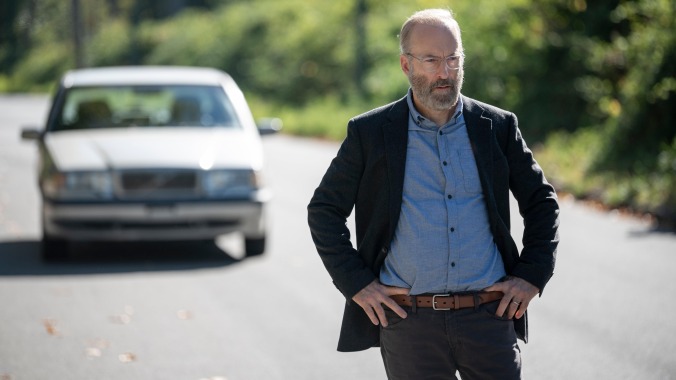Lucky Hank review: Meet Bob Odenkirk, misanthropic English professor
The actor is back on AMC in a comedy filled with existential beard strokes and midlife malaise

Bob Odenkirk stands reborn in Lucky Hank, his third AMC series, as the spitting image of George Saunders: his gray beard practically gerrymandering a stoic gaze, rumpled woven button-downs and thick frames, his austere blazer stark against a leafy campus. (We’re talking about the real George Saunders, not the depiction of the writer on this show, but more on that later.) The key difference is that Hank’s only novel isn’t even available in his own college bookstore.
When the show premieres March 19, we find Hank firmly entrenched, feeling not so lucky to be so, within the cloistered confines of academia, an English department chair and professor at the fictional Railton College. In this world of higher education and sandy Volvos, “de-chairing” is used as a threat, spots on “sabbatical wait lists” are used like barter, and a mention of “the accused” gets a knowing “we watch that in my gender analysis film class.” Despite the “sad forgotten town” Pennsylvania locale, there is a feel of ivy and Phillip Roth frustration, of John Williams’ Stoner and middle age wistfulness, of Michael Chabon’s Wonder Boys and autumnal cardigans (and, maybe to a less romantic degree, of Netflix’s The Chair). Here is a look at existence somehow both bucolic and bureaucratic, both achieved and frustrated. The production practically smells like tweed, tenure is seen almost as something of a prison sentence, and everything feels just a few quotidian losses from a slip downstream into the campus disenchantment of Who’s Afraid Of Virginia Woolf?
Based on Richard Russo’s 1997 novel Straight Man, the story is very much the feel of a longtime college English professor writing, yes, a longtime college English professor. Or, in the TV adaptation, it feels like smart people making up words for smart characters, with the resultant kind of chatty, zingy banter reminiscent of so much Clinton-era self aware indie. In the first scene a student challenges Hank’s aloof reticence, and pays the price, as a PG-version of the classroom evisceration scene in Tár sets the syllabus for a forthcoming midlife crisis and frustrated break with the efforts expected of him.
What did Hank do to end up so unlucky, uninspired in “mediocrity’s capital”? He is resigned to the notion that “being an adult is 80 percent misery,” and unable to see he has a pretty decent way to experience a midlife crisis, as far as these things go. There is his loving, supportive, successful wife (Mireille Enos), the type of spouse to blow bedroom argument stress by going for a late night run. The couple live comfortably, amiably, in an HGTV-tasteful open concept house. There is a good friend with whom to wack racketballs, philosophize on libido, watch field hockey (Diedrich Bader, born to play the good-natured pal). Even most of his peers at Railton, if not fully supportive, seem at least engaging, challenging (especially Cedric Yarbrough, a revelation of pent up spleen, making it easy to wonder why he hasn’t been more widely utilized since Reno 911!). Of course, one poet-in-residence does stab Hank’s nose with the metal rings of her notebook of “original work.” But still, his life’s actual crisis points remain whether to move to New York City or not, and the fact that their twenty-something daughter wants to borrow money and has a slightly dumb boyfriend. Also, it would seem Hank needs to figure out teaching, the eventual act of a second novel, and the daddy issues resulting from an estranged literary critic father. He could also maybe just use a gratitude list.
More important may be the question: What viewers did to deserve another glimpse of Odenkirk staking another claim on prestige TV a mere seven months after the finale of Better Call Saul and less than two years after suffering a heart attack (and not long since he alluded his next creative chapter would be in the vein of Jackie Chan)? It feels like an undue and too soon bonus to get to witness this ongoing career reconstruction. Consider the transformation from writing “I live in a van down by the river” for Chris Farley, to playing, say, an upbeat rapist on Mr. Show, to now, in the first episode, half-heartedly defending himself against de-chairing with bitter sarcasm: “The kid that I yelled at, he killed my governess, years ago, and I vowed my revenge, and it feels empty in the way novels predict.” With this he offers barely a half-smirk, one almost imperceptible, entirely to himself, the shoulder weight of his 50-some years glimpsed alongside the everyday wit needed to carry so many injustices and disappointments. You can see it too in an agitated finger tap on the table, when asked, “What keeps you from writing?” It’s a performance of subtlety and self-containment, showing a built-in history with simple, elegant beats.








































